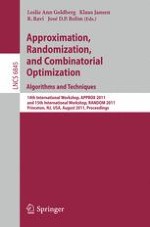2011 | OriginalPaper | Buchkapitel
Query Complexity in Errorless Hardness Amplification
verfasst von : Thomas Watson
Erschienen in: Approximation, Randomization, and Combinatorial Optimization. Algorithms and Techniques
Verlag: Springer Berlin Heidelberg
Aktivieren Sie unsere intelligente Suche, um passende Fachinhalte oder Patente zu finden.
Wählen Sie Textabschnitte aus um mit Künstlicher Intelligenz passenden Patente zu finden. powered by
Markieren Sie Textabschnitte, um KI-gestützt weitere passende Inhalte zu finden. powered by
An errorless circuit for a boolean function is one that outputs the correct answer or “don’t know” on each input (and never outputs the wrong answer). The goal of errorless hardness amplification is to show that if
f
has no size
s
errorless circuit that outputs “don’t know” on at most a
δ
fraction of inputs, then some
f
′ related to
f
has no size
s
′ errorless circuit that outputs “don’t know” on at most a 1 −
ε
fraction of inputs. Thus the hardness is “amplified” from
δ
to 1 −
ε
. Unfortunately, this amplification comes at the cost of a loss in circuit size. This is because such results are proven by reductions which show that any size
s
′ errorless circuit for
f
′ that outputs “don’t know” on at most a 1 −
ε
fraction of inputs could be used to construct a size
s
errorless circuit for
f
that outputs “don’t know” on at most a
δ
fraction of inputs. If the reduction makes
q
queries to the hypothesized errorless circuit for
f
′, then plugging in a size
s
′ circuit yields a circuit of size ≥
qs
′, and thus we must have
s
′ ≤
s
/
q
. Hence it is desirable to keep the query complexity to a minimum. The first results on errorless hardness amplification were obtained by Bogdanov and Safra (FOCS 2007). They achieved query complexity
$O\big((\frac{1}{\delta}\log\frac{1}{\epsilon})^2\cdot\frac{1}{\epsilon}\log\frac{1}{\delta}\big)$
when
f
′ is the XOR of several independent copies of
f
. We improve the query complexity (and hence the loss in circuit size) to
$O\big(\frac{1}{\epsilon}\log\frac{1}{\delta}\big)$
, which is optimal up to constant factors for nonadaptive black-box errorless hardness amplification. Bogdanov and Safra also proved a result that allows for errorless hardness amplification within NP. They achieved query complexity
$O\big(k^3\cdot\frac{1}{\epsilon^2}\log\frac{1}{\delta}\big)$
when
f
′ consists of any monotone function applied to the outputs of
k
independent copies of
f
, provided the monotone function satisfies a certain combinatorial property parameterized by
δ
and
ε
. We improve the query complexity to
$O\big(\frac{k}{t}\cdot\frac{1}{\epsilon}\log\frac{1}{\delta}\big)$
, where
t
≥ 1 is a certain parameter of the monotone function.
